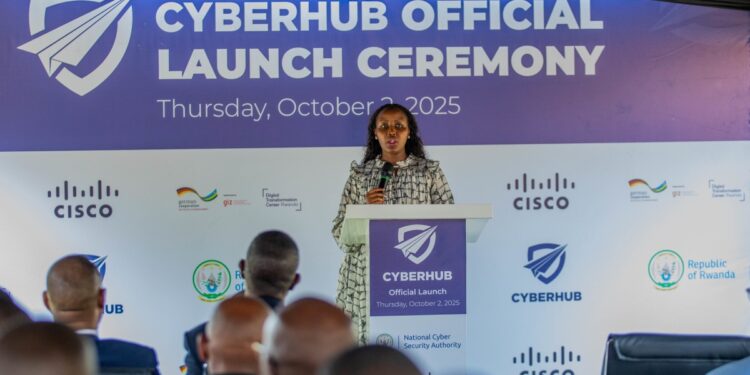Rwanda has launched Africa’s most ambitious cybersecurity training center, targeting 200 graduates annually while the continent struggles with 68,000 unfilled security roles that threaten digital growth.
The National Cyber Security Authority (NCSA) opened the CyberHub on October 2 at the University of Rwanda’s College of Science and Technology in Kigali. Cisco and German development agency GIZ partnered with Rwanda to create this center of excellence that houses a cybersecurity academy, innovation hub, and advanced tech labs.
Rwanda Targets 30% Women in Cybersecurity Training Programs
The CyberHub will train 200 graduates each year. Rwanda mandates that women make up at least 30% of each intake. This focus addresses Africa’s dual challenge of skills shortage and gender imbalance in tech sectors.
Students gain access to Cisco Networking Academy, which provides training in digital literacy, artificial intelligence, and advanced cybersecurity certifications. The program also exposes learners to emerging technologies including AI-powered threat detection tools and machine learning systems for cybersecurity response.
“With modern infrastructure, relevant curriculum, and proven methodologies, the mission of the CyberHub is to help address critical skills gaps,” NCSA stated in their launch announcement.
Africa Faces 23% Cybersecurity Workforce Gap
Africa currently has a 23% cybersecurity workforce gap, representing about 68,000 unfilled positions. This shortage creates a bottleneck for digital resilience across the continent as cyber threats increase.
Recent data shows that 90% of organizations globally have cybersecurity skills gaps. In Africa, 55% of firms planned to recruit new cybersecurity experts in 2023, but the continent still faces significant shortages.
The global cybersecurity workforce gap has reached a record 4.8 million unfilled roles, a 19% year-over-year increase. Rwanda’s CyberHub directly addresses this crisis by building local talent pools.
Rwanda Achieves Top-Tier Global Cybersecurity Status
Rwanda earned Tier 1 status in the International Telecommunication Union’s 2024 Global Cybersecurity Index with a score of 98.08 out of 100. Only 46 countries worldwide achieved this top ranking.
The country ranks among just five African nations to reach Tier 1 status, alongside Ghana, Kenya, Mauritius, Tanzania, Egypt, and Morocco. This recognition validates Rwanda’s cybersecurity infrastructure and policies.
Rwanda’s digital sector expanded 19% in the first quarter of 2025, making it the second-largest contributor to GDP growth. The CyberHub builds on this momentum by strengthening the foundation for continued digital transformation.
Cisco Partnership Brings Global Expertise to African Hub
Shain Rahim, Cisco’s East Africa Regional Manager, emphasized the company’s commitment to Rwanda’s digital future. “Investing in Rwanda through the CyberHub reflects Cisco’s commitment to supporting the country’s digital transformation and preparing its workforce for the future,” he said.
The CyberHub operates under Cisco’s Country Digital Acceleration program, launched in East Africa in 2023. This global initiative spans more than 1,600 projects across 50 countries, focusing on inclusive innovation ecosystems and digital resilience.
Over 25 years, Cisco’s Networking Academy has trained more than 16.6 million learners in Africa with essential digital skills including networking, cybersecurity, and programming.
Strategic Location Positions Rwanda as Regional Cybersecurity Leader
The University of Rwanda’s College of Science and Technology provides the perfect academic environment for the CyberHub’s mission. Students access both theoretical knowledge and practical hands-on experience in state-of-the-art facilities.
The center creates a collaborative space where learners and industry stakeholders can explore emerging technologies together. This approach bridges the gap between academic learning and real-world cybersecurity challenges.
Rwanda plans to use the CyberHub as an anchor for certifications and AI training programs. The facility supports the country’s goal of becoming a regional technology hub.
Training Programs Target Emerging Technology Skills
The CyberHub curriculum covers digital literacy fundamentals through advanced cybersecurity certifications. Students learn to use AI and machine learning tools for threat detection, investigation, and response.
Training programs prepare graduates for immediate employment in cybersecurity roles. The focus on practical skills ensures students can tackle evolving challenges in data protection and privacy.
GIZ serves as an enabling partner in establishing the CyberHub, bringing German expertise in technical cooperation and development. This partnership combines local knowledge with international best practices.
Digital Sector Growth Drives Demand for Cybersecurity Talent
Rwanda’s digital sector growth of 19% in Q1 2025 creates massive demand for skilled cybersecurity professionals. The CyberHub directly supports this growth by supplying qualified talent to meet industry needs.
The center’s mission extends beyond training individual students. It plans to build an entire ecosystem for cybersecurity and data privacy innovation in Rwanda and across the region.
Qualified jobs in emerging technologies require specialized skills that traditional education programs often don’t provide. The CyberHub fills this gap with industry-relevant training and facilities.
This initiative positions Rwanda as a continental model for addressing cybersecurity skills shortages through strategic partnerships and targeted investment in human capital development.

















